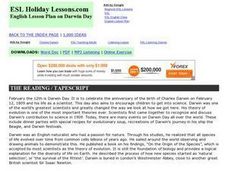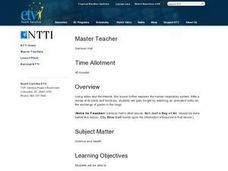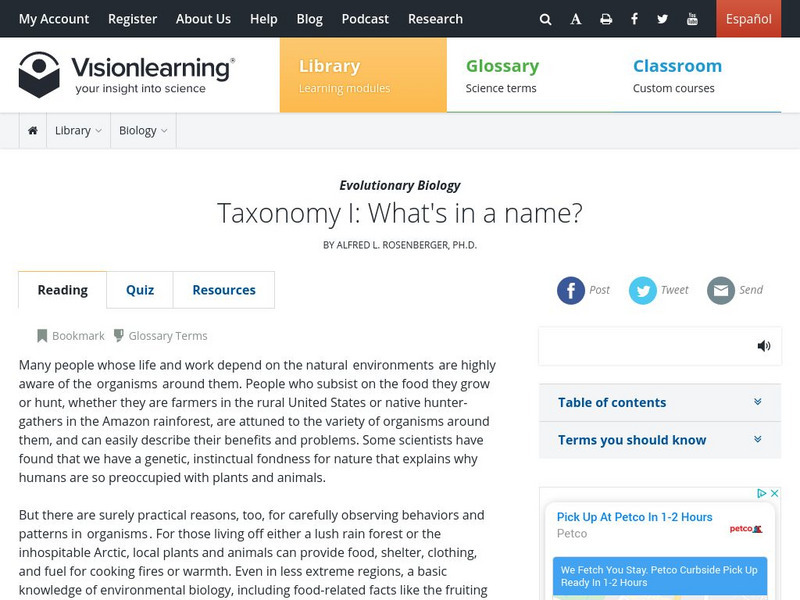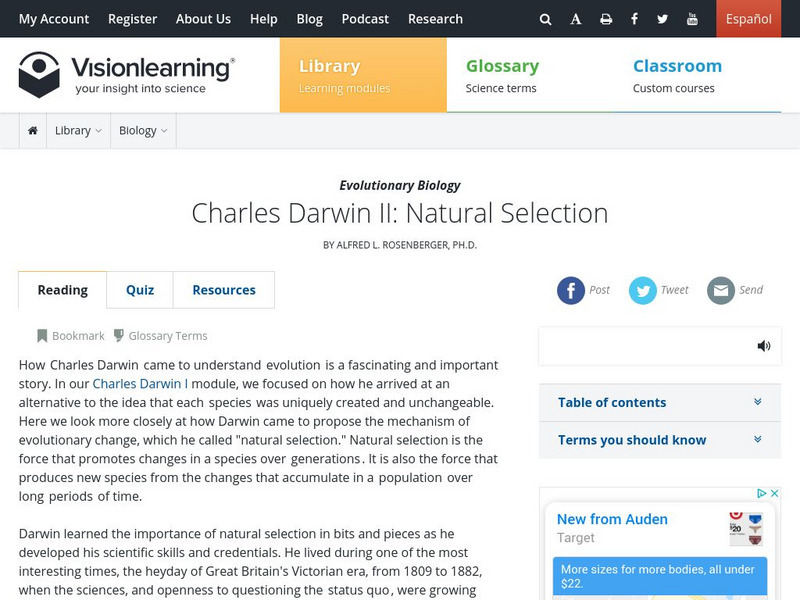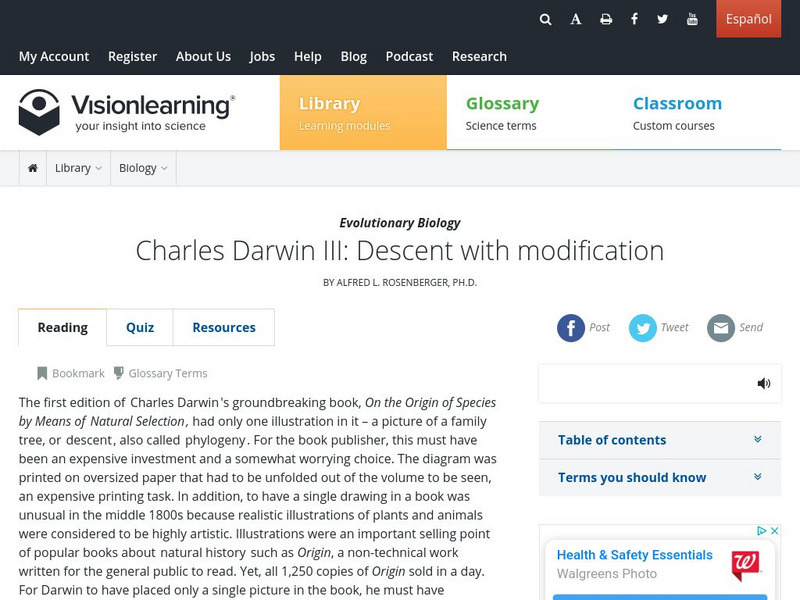Curated OER
Internet Lesson Plan: Mitosis and Meiosis
Students learn the processes of cell division, both somatic and sexual through lecture. They participate in an Internet instructional activity to strenghten their understanding of mitosis and meiosis.
Curated OER
Plants
Student identify the characteristics of plants. Through hands-on demonstration, they create a model of plant parts. Young scholars differentiate between the major divisions of the plant kingdom with a particular emphasis on the...
Curated OER
Cell 7 Plant v Animal Cells
Students differentiate between plant and animal cells. They identify the structures central to plant cells. They complete a Venn Diagram listing the differences between animal and plant cells.
Curated OER
Dietary Guidelines/Food Pyramid
Students study the recommended Dietary Guidelines for Americans and the Food Guide Pyramid. They discuss the foods they eat, watch a video about the Food Pyramid and examine actual foods portioned out into recommended serving sizes.
Curated OER
Various Questions II
In this online interactive ESL worksheet, students respond to 18 fill in the blank questions regarding the phrasing of questions. Students check their answers immediately.
Curated OER
ESL Holiday Lessons: Biodiversity Day
In this language skills worksheet, students read an article about World Biodiversity Day. Students respond to 6 matching questions, 29 fill in the blank questions, 30 multiple choice questions, 12 word scramble questions, 30 short...
Curated OER
Darwin Day
In this Darwin Day learning exercise, students read or listen to a tape passage about Charles Darwin, then match phrases, fill in the blanks, choose words, unscramble words and sentences, put sentences in order, write discussion...
Curated OER
The Cell - Internet Activity
In this cells worksheet, students click on the links to learn about the plant and animal cells complete a comparison chart and answer short answer questions about it. Students complete 10 questions total.
Curated OER
Word Groups 4
In this word groups worksheet, students put words that are together into a group. Students put 9 problems of words into a group on this worksheet.
Curated OER
Relationships and Biodiversity Lab Practice
In this biodiversity activity, high schoolers determine the relationship and complete the evolutionary tree for the plants listed. Students review genetic code and DNA sequencing. This activity has 1 graphic organizer, 8 multiple choice,...
Curated OER
CO2 Blow Out!
Fifth graders determine that carbon dioxide is a gas given off during respiration and that oxygent is the gas that is absorbed during respiration. They determine the air capacity of the lungs.
Curated OER
In the Scheme of Things
Fifth graders examine the food webs of different animals. They discuss the characteristics of those animals as well. They work together to develop their own definition for the word niche.
Curated OER
Hardy-Weinberg Problems Tutorial
Learners are tested on their ability to solve mathematical problems dealing with the Hardy-Weinberg principle. There are 7 basic types of Hardy-Weinberg Problems which are randomly chosen by the program. Students sit at the computer...
Curated OER
A.P. Exam Calculator Review
Students review ways to use the calculator to graph a function, solve an equation, calculate a numerical derivative, and calculate a definite integral. They practice using their calculator to solve a set of sample exercises. Students...
Curated OER
Assessment & Evaluation
Seventh graders study elapsed time, radioactive decay and half-life. In this time machine lesson students complete several activities and view a presentation.
Vision Learning
Visionlearning: Biology: Taxonomy I: What's in a Name
Instructional module focusing on biological classification. Discussion includes Carolus Linnaeus' taxonomic classification system for organizing and classifying living things. Site also includes an interactive practice quiz and links...
Vision Learning
Visionlearning: Biology: Taxonomy Ii: Ruling Names of Giants
Instructional module focusing on binomial nomenclature. Discussion includes Carolus Linnaeus' taxonomic classification system for naming all species. Site also includes an interactive practice quiz and links relating to the topic.
Vision Learning
Visionlearning: Biology: Charles Darwin Ii: Natural Selection
Instructional module focusing on Charles Darwin's explanation of natural selection as the mechanism for evolution. Discusses how this force of natural selection promotes changes in species over time. Site also includes an interactive...
Vision Learning
Visionlearning: Biology: Charles Darwin Iii: Descent With Modification
Instructional module focusing on Charles Darwin's theory of Descent with Modification. Discusses how slight changes from parent to offspring create variation and potentially create new species over time. Site also includes an interactive...
Vision Learning
Visionlearning: Biology: Genetics Ii: Mendel and Multiple Genetic Traits
Instructional module focusing on Gregor Mendel's scientific legacy and analysis of multiple genetic traits. Discussion includes Mendel's work on his second law, the Law of Independent Assortment, which states that different traits are...
Soft Schools
Soft Schools: Biochemistry and Organic Chemistry Quiz
Take an interactive quiz over biochemistry and organic chemistry. After completing the quiz, check your score, and then revisit any incorrect question for further review.
Soft Schools
Soft Schools: Cellular and Molecular Biology : The Cell and Cell Structure Quiz
Take this interactive, multiple-choice quiz over cells and cell structure, then review your score and any missed questions at the end.
Savvas Learning
Pearson's the Biology Place: Cell Respiration
This excellent interactive website about cellular respiration provides an overview then goes into the details that can be so difficult to understand. The practice, review, and quiz pages should help solidify understanding.
Soft Schools
Soft Schools: Biological Foundations/scientific Method Quiz
Take this interactive, multiple-choice quiz over biology concepts and the scientific method, then review your score and any missed questions at the end.








